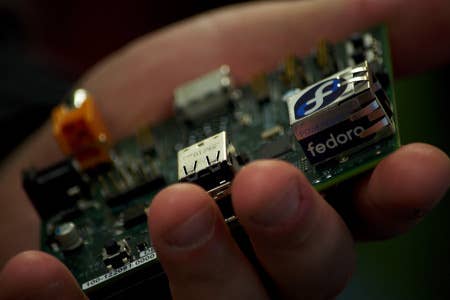No humble Pi for coding campaigners
The £22 PC is off to a flyer - and its timing couldn't be better says Johnny Minkley
If you picked up a national newspaper, or tuned into a major news broadcaster over the past few days, it will have been hard to miss the excitable reporting of it.
Even the most obdurate antagonists of video games, such as the Mail, the Metro and film critic Roger Ebert, hailed the arrival of the £22 credit card-sized PC expected to inspire a new generation of game designers.
Naturally, much of the coverage outside the games media did not lead with the gaming angle -Raspberry Pi's mission to get kids coding takes in a wide spectrum of industries, from visual effects to banking and beyond.
But, whether it's Frontier chairman and Raspberry Pi trustee David Braben taking to the airwaves to extol the virtues of programming, or the indefatigable Ian Livingstone pestering the Government into backing the teaching of it, the media hype and consumer hysteria surrounding Pi's launch has marked the latest success in a broader campaign in which the games industry has played the defining role - and from which it now stands to reap the rewards.
It's worth reflecting on how startlingly well the planets have aligned here. Raspberry Pi arrives three months after the 30th anniversary of BBC Micro, the computer that sparked the coding craze of the '80s, and not quite two months since Michael Gove, the Education Secretary, announced plans to ditch the teaching of "dull and demotivating" ICT in favour of programming in UK schools - the main recommendation of last February's Livingstone-Hope Next Gen report.
Meanwhile, on the 30th anniversary of the BBC's Computer Literacy Project, early details have emerged of the corporation's own "BBC Micro 2" initiative, a development platform understood to be tied to a new series of supporting educational broadcasts designed, again, to help children learn to code.
With an intoxicating mix of amazing new technology and timely nostalgia for the 'good old days', sharpened by bleak visions of Britain's technologically handicapped future, it's little wonder the story caught on.
As clever as it is, Raspberry Pi, six years in development, could have ended up as little more than an eccentric novelty had it emerged in a different climate. Now, the goal to get one into the hands of every British school kid seems a lot more plausible with coding set to return to the classroom.
"With an intoxicating mix of amazing new technology and timely nostalgia for the 'good old days', sharpened by bleak visions of Britain's technologically handicapped future, it's little wonder the story caught on."
Equally, in the case of the Livingstone-Hope report, what could have been idly dismissed as special-pleading gained serious weight when Google chairman Eric Schmidt was persuaded to commit the tech colossus to the cause.
Where the Government could have ignored the games industry, it was already in bed with Google - literally in the case of David Cameron's outgoing strategy guru, Steve Hilton, married to Google's public policy chief, Rachel Whetstone, the couple also acting as godparents to Cameron's late son, Ivan.
The Next Gen Skills "coalition" craftily spun together by Livingstone and his team thus ensured the lobbying operation gained irresistible momentum following Schmidt's widely-reported intervention during a speech in Edinburgh.
In an industry still paranoid about its public image, the games industry's contribution to the new coding revolution could do a great deal to help change perceptions for the better.
I recently chaired a debate at BAFTA during which two of the panelists, UKIE CEO Dr Jo Twist and Rebellion co-founder Jason Kingsley, clashed over the thorny issue of diversity in the workplace, which extended out into an impassioned discussion with the audience.









